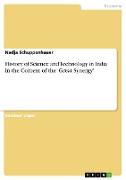History of Science and Technology in India in the Context of the 'Great Synergy'
BücherAngebote / Angebote:
Seminar paper from the year 2008 in the subject Business economics - Economic and Social History, grade: 1, 0, European University Viadrina Frankfurt (Oder) (Lehrstuhl für Wirtschafts- und Sozialgeschichte der Neuzeit), course: The Great Divergence. History and Legacy of Industrialization in Europe and Asia, language: English, abstract: The purpose of this paper is the discussion of a recent article presented by Joel Mokyr
who offered, according to his own words, a new "variant of the European Miracle question"1.
The main thesis of his article The Great Synergy: the European Enlightenment as a factor in
Modern Economic growth points to the European Enlightenment as being a crucial factor for
attaining and establishing modern, i.e. sustainable economic growth in Europe once the
British Industrial Revolution had overcome its humble beginnings at the end of the eighteenth
century.
Mokyr argues that the stability of economic growth which was reached in Europe after
1825 was to a great extent due to a new attitude towards the relation between technology and
progress. This new attitude was the result of a development that had its roots in the European
Enlightenment where the foundations for a new understanding of science and technology
were laid. The outcome of this development was the unique 'idea of research' that made
scientists and craftsmen cooperate, giving way to a very fruitful convergence of science and
technology that helped making sustainable economic growth possible. This evolution mingled
with the modification of institutional mechanisms which was a result of the Enlightenment,
too. These two trends both formed a 'Great Synergy' that finally yielded the 'European
Miracle'.
To prove and strengthen his thesis, Mokyr compares the history of European sciences
with those practiced in China coming to see that Chinese sciences were confined to and
restricted by the Mandarin rulers, thus a situation similar to pre-en
Folgt in ca. 10 Arbeitstagen

